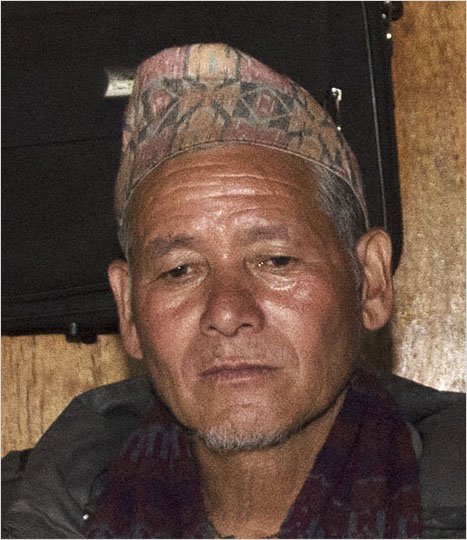Yam Bahadur Magar is 57 years old. He is married with three children and lives as a farmer in Tholodunga.
He is recognised by the whole community as an outstanding master carpenter and master builder, as he manages building sites all over Nepal. He taught himself his trade and is often absent from the village, even though he is a farmer like everyone else.
His house has been declared uninhabitable (a number of cracks), but Tara has shown him how to repair it.
My father had lived through the 1934 earthquake. He told me about it; he explained to me how to protect human lives. But I’d also experienced the 1990 and 2011 earthquakes, so I knew what it was like.
On 25 April, around midday, I was in the fields and it was a bit cold. On 12 May I was up in the mountains, harvesting wild honey. I was walking up the Koledo slope with a friend when the earthquake hit. I grabbed him with one hand and held on to a tree with the other. I was so scared. It was unimaginable. The mountains were moving. I thought it was the end of my life. I saw several landslides in Koledo.
Afterwards, people gathered and looked for protected places. They looked for food and objects to protect them from further earthquakes. They went into destroyed houses to rescue people and belongings. The children were shaking, crying and scared. Everyone thought they were going to die. It was a terrible situation. If the earthquake had happened at night, there would have been deaths, like in my house where material collapsed on our bed. For 2 or 3 days I tried to save the people and the most important things, because I have political responsibilities in the village.
The problem quickly became how to sleep. We prepared a temporary shelter with woven bamboo fences, mats and plastic sheeting for the night. At first we all got together: Rai, Magar, BK (Dalit). We wanted to be together to die together or to help each other. For 25 days, 80 of us lived in the temporary shelter because the aftershocks wouldn’t stop.
When the earthquake struck on 25 April, the first thing we said to each other was to get out of the houses. On 12 May, with my friend in Koledo, we immediately said that we had to go into the houses to get the news.
We can’t know the cause of these earthquakes. It’s God who decides. Because there are things that don’t work properly: dishonest people, no discipline. It’s a punishment sent by God.
The second earthquake caused numerous landslides (Koledo). Information from Namche led us to believe that the Dudhkosi river was blocked (by landslides) and that this was going to flood the lower parts of Rapcha. So we had to get the people living in the lower parts of Rapcha, in the hamlets of Bodu and Lop, to move up. A little later the police came to find out if there were any victims. They visited each house to take stock of the destruction.
When I think back to those moments, I say to myself that if these tremors had happened at night with the inhabitants in their houses, there would have been no chance of survival. With the fragile soil and the houses weakened by the first tremor, life in Rapcha was over. And so I asked God to protect the Nepalese, to stop the earthquakes.
After the earthquakes, people’s opinions changed. They now know that you have to build earthquake-proof houses that aren’t too big, that you have to protect children with earthquake-proof schools.
I was disappointed by the state aid. The police and administration have done a poor job. There was favouritism for people close to them, including NGOs. There was no transparency. I spent two months living in Namche. I saw that there was no strategy to help the victims and that aid went to those who didn’t need it most.
For the future, when it comes to aid, we need to think about a classification that distinguishes between people who need help the most and those who can rebuild on their own.
Marc Béchet


